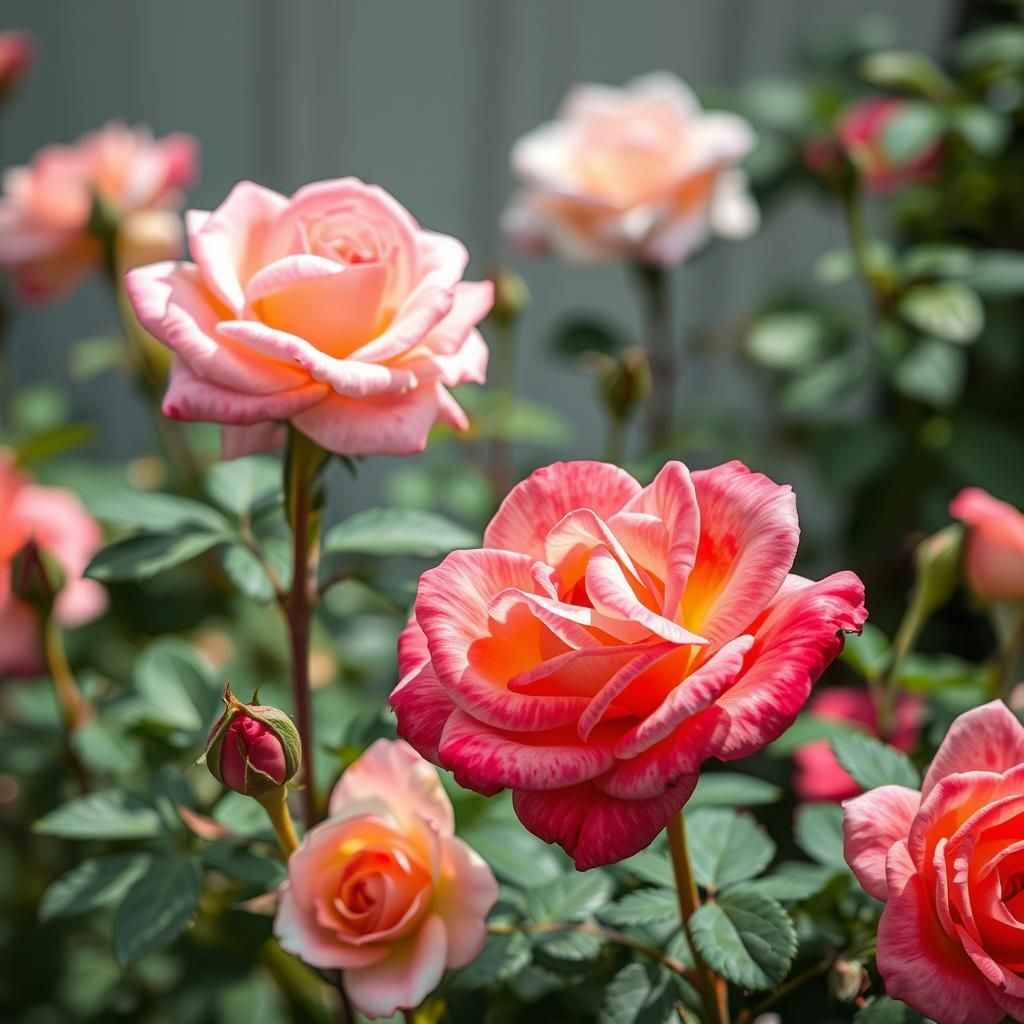Discover What Plants to Plant with Roses for a Vibrant Garden

Creating a vibrant garden is an art that involves thoughtful combinations of plants, especially when it comes to roses. These beloved blooms can serve as the focal point of your outdoor space, but pairing them with the right companion plants can enhance their beauty and health. Understanding which plants thrive alongside roses not only maximizes their visual appeal but also improves soil health, attracts beneficial pollinators, and reduces pests. In this article, we will explore various plants that complement roses beautifully, ensuring your garden bursts with color, fragrance, and life throughout the growing season.
Companion Plants for Roses
When considering what plants to plant with roses, it is essential to choose companions that not only thrive under similar conditions but also complement the aesthetic and health of the rose plants. Some excellent companions include lavender, which repels harmful pests while enhancing the beauty of the rose garden with its aromatic presence. Other favorable options are catmint and salvia, both of which attract beneficial pollinators and deter common rose pests. Additionally, planting marigolds can help to control nematodes and other detrimental insects, while herbs like thyme can provide ground cover and retain soil moisture. Together, these plants can create a thriving, vibrant garden that benefits both roses and their companions.
Lavender
Lavender is a highly aromatic plant that not only looks stunning next to roses but also helps repel pests such as aphids and mosquitoes. Its drought-resistant nature and capacity to thrive in well-drained soil make it an excellent choice for gardeners who want to minimize water usage while ensuring robust plant health.
Catmint
Catmint, also known as Nepeta, is a fantastic companion for roses as it blooms with abundant purple flowers that attract beneficial pollinators like bees and butterflies. Its aromatic foliage can deter unwanted pests, making it a practical and beautiful addition to any rose garden.
Salvia
Salvia is another great companion for roses due to its ability to attract various beneficial insects while deterring harmful ones. With its colorful spikes of flowers and varied species to choose from, salvia complements the rose plants and enhances the overall landscaping aesthetic.
See also:
Marigolds
Marigolds are often recommended for rose gardens because they produce natural compounds that deter nematodes and other harmful insects. Their bright, cheerful flowers provide a striking contrast to the soft hues of roses and can help maintain soil health by adding organic matter when they die back.
Thyme
Thyme is an excellent ground cover plant that stabilizes soil and helps retain moisture. Its low-growing habit makes it perfect for preventing weeds around roses, while its aroma and flavor enhance culinary dishes, making thyme a practical and beneficial companion plant.
| Companion Plant | Benefits | Aesthetic Appeal |
|---|---|---|
| Lavender | Repels pests | Aromatic and colorful |
| Catmint | Attracts beneficial pollinators | Purple flowers |
| Salvia | Deters harmful insects | Colorful flower spikes |
| Marigolds | Controls nematodes | Bright blooms |
| Thyme | Soil moisture retention | Low-growing cover |
Companion Planting Techniques for Roses
Companion planting with roses can enhance your garden's vibrancy by promoting healthy growth and deterring pests. By carefully selecting plants that complement the roses, you can create a more harmonious ecosystem. For instance, herbs like basil can repel pests, while marigolds provide excellent color contrast and help to deter nematodes. Additionally, plants such as lavender and phlox can attract beneficial pollinators, which are crucial for the overall health of your garden. Understanding the ideal partners for your roses not only improves their growth but also enriches the garden's visual impact.
Best Companion Plants for Roses
Companion plants such as chives, garlic, and onions are excellent choices to plant alongside roses. These bulbous plants exude compounds that can ward off common pests like aphids and spider mites, providing a protective barrier for your roses. Additionally, these plants contribute to the health of the soil, ensuring that the roses receive necessary nutrients while actively preventing disease. The combination of these plants not only protects your roses but also adds texture and depth to your garden.
Herbs That Thrive with Roses
Herbs such as thyme, basil, and sage not only complement the beauty of roses but also serve practical purposes. These aromatic herbs can deter harmful insects and provide a fragrant aroma that enhances the garden experience. For example, basil is known to repel the Japanese beetle, a notorious pest for roses. Furthermore, these herbs attract beneficial insects like bees, aiding in pollination. Overall, incorporating herbs into the rose garden boosts both health and aesthetics.
See also:
Colorful Annuals to Pair with Roses
Annuals like petunias, geraniums, and snapdragons can add a vibrant splash of color when planted with roses. These flowers offer a variety of colors and heights that can enhance the visual appeal of your rose garden. In addition to their stunning appearance, annuals can help suppress weeds, which compete for nutrients and water. Their ability to attract pollinators and beneficial insects also contributes to a thriving ecosystem, making them ideal companions for your roses.
Ground Covers for a Healthy Rose Bed
Utilizing ground cover plants such as creeping thyme, ajuga, and sedum helps to prevent weeds while enhancing moisture retention in the soil around roses. These low-growing plants provide a natural mulch that keeps the soil cool and moist, creating an optimal growing environment for the more delicate roses. Ground covers can also simplify maintenance by reducing the need for frequent weeding and watering, making them a practical choice for a sustainable rose garden.
Understanding Soil and Sunlight Needs
The successful cultivation of roses alongside companion plants hinges on a deep understanding of soil and sunlight requirements. Roses typically thrive in well-drained, fertile soil that is rich in organic matter, while many companion plants have similar preferences. It’s essential to assess the light requirements of each plant, as most roses enjoy full sunlight. By ensuring that your selected companions have compatible needs for both sun and soil, your garden can flourish, offering a beautiful balance and support for each plant.
Questions from Our Readers
What plants should I avoid planting with roses?
When considering companion plants, it's crucial to avoid those that can harbor pests or diseases that could harm roses. Plants like cabbages, potatoes, and geraniums can attract harmful insects and are best kept away from your rose garden to ensure their healthy growth.
What are the best companion plants for roses?
Some of the best companion plants for roses include lavender, scented geraniums, and catmint. These plants not only have a pleasing aroma but also attract beneficial insects like pollinators while helping to deter harmful pests that may damage your roses.
See also:
How do companion plants benefit roses?
Companion plants can provide numerous benefits for roses, such as improving soil quality, providing shade, or acting as a natural pest control. For instance, certain herbs can help repel insects, while plants like marigolds can deter nematodes and promote a healthier growing environment for your roses.
Can I plant vegetables near my roses?
While it is generally possible to plant certain vegetables near roses, you should choose wisely. Carrots, onions, and spinach are typically compatible, as they do not compete for the same nutrients and can thrive side by side without negatively impacting the health of your roses.

If you want to read more articles like Discover What Plants to Plant with Roses for a Vibrant Garden, we recommend you check out our Landscaping category.
Leave a Reply
Related Articles